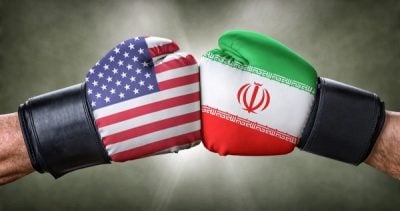US Sanctions Against Iran: Double Illegitimacy at the Time of Covid-19

The WHO now calls the Coronavirus epidemic a ‘pandemic’ and calls on all countries to apply drastic health policies.
The rapid spread, morbidity and mortality associated with the disease are all the more worrying as they can quickly deplete health system resources to meet the needs of people. All countries are thus on alert.
In the United States, President Trump, after minimizing the threat for a while, has declared a state of national emergency. Prime Minister Trudeau invites people to reduce their trips for the time being.
Italy, overwhelmed, announced 250 dead in 24 hours, and chose the patients to be treated as a priority. Iran has declared 1000 new cases in 24 hours, knowing that the numbers are lower than the reality since the country does not have the resources to make the full national diagnosis.
Only China has turned the tide, with only 8 new cases reported in the last 24 hours, the lowest figure since mid-January. Iran and Italy are now the “front line” countries in the fight against COVID-19.
The situation is particularly serious in Iran where there is “a shortage of breathing apparatus and oxygen”, according to the head of WHO’s emergency health programs, Dr Ryan. WHO Director-General Dr Tedros Adhanom Ghebreyesus says that ‘Iran is doing its best. They need more equipment.’
The behavior of the Covid-19 dictates seeking health security through a concerted global effort. It requires collaboration and coordination of actions without borders since our health security is more than ever interdependent.
The Covid-19 highlights the dual illegitimacy of the United States’ draconian and unilateral sanctions against various countries, Iran in particular.
In this case Iran, seriously affected by the pandemic, is unable to sell its oil. And banking sanctions prevent it from obtaining essential products for the diagnosis, prevention and treatment of coronavirus. These sanctions jeopardize both lives in Iran and the global fight against the pandemic.
The United States refuses to withdraw the sanctions despite the request of the United Nations while Iran is one of the epicenters of the pandemic in the Middle East region, as China has been in Asia and Italy is in Europe. How many in Iran will die needlessly because of these illogical, illegitimate, immoral, and illegal economic sanctions?
Let us add that the sanctions of the USA against Iran are condemned by the UN, which endorsed the nuclear agreement through resolution 2231 of the UN Security Council.
Certainly the Iranian government is responsible for the shortcomings in the management of the health crisis. However, Italy is currently experiencing the same propagation situation, but the European budgets set aside for the control of the Covid-19 are in the order of several billion euros per country. Iran has much more limited financial resources, largely blocked by sanctions, with a population equivalent to that of Germany.
According to a US government-funded site, “Radio Farda,” Iran can only export 250,000 barrels of oil per day, one-tenth of what it exported before the 2015 agreement.
We can see that the strategy of Trump’s ‘maximum pressure’ on Iran (an unprecedented financial and commercial blockade aimed at impoverishing the Iranians in the hope of pushing them to overthrow the government) has more responsibility for the country’s current difficulties in the face of the pandemic.
In this context of extreme tension imposed by the United States, the Iranian government felt, from the outbreak of the Covid-19 epidemic, that it should not appear vulnerable.
With the US treasury having imposed third party sanctions on European, Indian and other firms, Iran has been pushed to increased dependence on China, the only country capable of somewhat challenging Trump. Iran has therefore not had the luxury of cutting trade and travel with China.
The call this week of the United against Nuclear Iran (UANI) to prevent pharmaceutical companies holding ‘special licenses’ (defined as ‘humanitarian exemptions’) from doing business with the Iran says a lot about the credibility of the protagonists of sanctions.
Another lobby recognized as a sanctioner, the FDD (Federation for defense of democracy) welcomed the coronavirus outbreak: ‘the virus has harmed the economy of the country where the sanctions could not have done it’.
The rhetoric weaponizing the “legitimate fight for human rights” to justify these cruel sanctions before public opinion is severely tested by the difficulties of Iran and the suffering of the Iranians, kept in a situation of vulnerability to the pandemic against all civilizational standards.
Health, hygiene and access to medical care are inalienable human rights. The American and Iranian peoples, and all of humanity, have a common enemy in this pandemic: the coronavirus and the unjust and inhuman sanctions.
*
Note to readers: please click the share buttons above or below. Forward this article to your email lists. Crosspost on your blog site, internet forums. etc.

